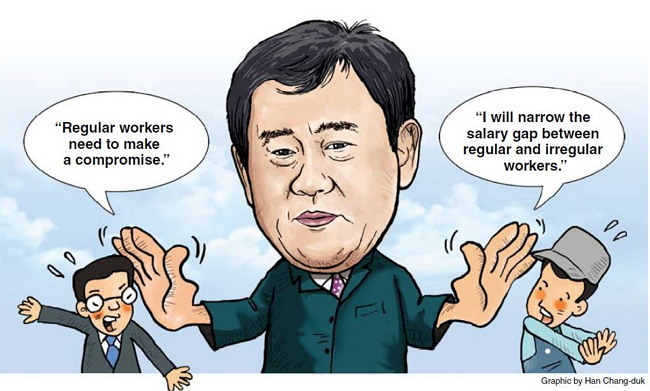The pie will not get any bigger, at least for several years, and the only way to make it feed as many people as possible is to break it down into smaller pieces, according to the Minister of Strategy and Finance Choi Kyung-hwan.
Choi was not talking about the economy this time. He was talking about the income being shared by the nation’s workforce.
The minister believes that in order to enhance the rights of temporary workers, regular workers will have to make some sacrifices. While his idea may sound logical, it invited a barrage of criticism that the government was seeking a downward equalization of labor rights.
The latest controversy was triggered by economic policy department director Lee Chan-woo last Monday when he gave a briefing on the ministry’s policy plans for next year.
“We are considering easing the dismissal standards for regular workers,” he said.
By easing them, companies would have an easier time letting go of regular workers to give them more leeway to hire temporary employees.
The ministry said “nothing had been decided,” but on Tuesday, the finance minister backed the director’s words by saying that regular workers were “overprotected.”
“The reason companies shun recruitment is because they cannot afford the growing number of regular workers,” Choi told reporters in a policy seminar.
This was not the first time that he had suggested that regular workers needed less legal protection if companies were to hire more.
Since he took office in July, Choi has said on a number of occasions that the employment market conditions are too harsh on the corporate sector.
In 2007, the government implemented policies that forced firms to transfer a large part of their irregular workforce to regular worker status to narrow the labor market divide. But as a result, companies started to reduce the contract periods for irregular workers.
Labor rights vs. market flexibilityThe idea of undermining the legal rights of regular workers is largely based on two beliefs ― one is that regular employees enjoy greater protection, and the other is that if there are less resources spent on regular workers, there would be more to go around for irregular workers.
But a majority of experts have said that the logic of the second prerequisite is flawed.
“Korean companies are already able to dismiss employees without too much restraint,” said Kim Jong-jin, researcher at the Korea Labor and Society Institute.
He also pointed out that allowing companies to more easily carry out layoffs may trigger social instability and boost social polarization, as the unemployed here suffer more disadvantages than those in more advanced nations.
Bae Gyu-sik, a labor policy research director at the Korea Labor Institute, said both the corporate sector and the employees must work to help even out the labor market.
“Companies should change their promotion methods and wage systems so that their employees can stay on for longer, even if that means accepting less pay,” he said.
Kim Sung-hee, a professor at Korea University’s Graduate School of Labor Studies, warned that cutting down on the rights of the regular employees would do little to promote those of irregular workers.
“Companies are more likely to take advantage of the situation to maximize their profits, instead of allocating the spare capacity to irregular workers, which would lead to an overall degeneration of the employment market,” Kim said.
Some, however, agreed with the finance minister that the Korean labor market needs more flexibility.
“Employers should be allowed to hire and lay off workers more freely, based on free market principles,” said Choi Dong-geun, professor of economics at Myongji University, citing the case of GM Korea, where most of the dismissed employees were rehired when business conditions improved.
Most of the experts agreed that the root of the problems is limited resources.
“Unless the pie expands, the government’s efforts to create new jobs may only lead to the downsizing of existing jobs, either in number or scale,” said Kim Gwang-seok, senior researcher at Hyundai Research Institute.
Persisting trauma of Ssangyong Motors
In its recent ruling, the Supreme Court effectively upheld the legitimacy of massive layoffs by Ssangyong Motors in 2009 by overturning a previous appellate court ruling that had sided with the laid-off workers.
The company had legitimate reasons for laying off the employees, and also tried its best to keep as many people on the payroll as possible, the court found.
Since the carmaker filed for court receivership in January 2009, a total of 2,646 employees ― regular and irregular ― were dismissed, among which 153 filed a nullity suit and demanded reinstatement.
During the struggle, which has lasted for five years, more than 20 unionists or their family members died of illness or committed suicide.
“We will fight to the end, but feel burdened nevertheless by the societal impact of the Supreme Court ruling,” said Kim Deuk-jung, head of the Ssangyong Motors case at the Korean Confederation of Trade Unions.
This is because they view the ruling as echoing the pro-business policy trends in Korean society.
“Regular workers enjoy minimal employment security as it is, even though these are the people who sustain the nation’s domestic consumption,” said Jo Don-mun, professor of sociology at the Catholic University of Korea.
“If their rights are reduced, it would lead to a general market slump and create a vicious economic circle.”
The Federation of Korean Trade Unions also denounced the court and the corporate sector for using employment flexibility as a means to justify mass layoffs despite Korea’s employment stability being one of the lowest among OECD nations.
By Bae Hyun-jung & Shin Ji-hye
(
tellme@heraldcorp.com) (
shinjh@heraldcorp.com)





![[Exclusive] Hyundai Mobis eyes closer ties with BYD](http://res.heraldm.com/phpwas/restmb_idxmake.php?idx=644&simg=/content/image/2024/11/25/20241125050044_0.jpg)
![[Herald Review] 'Gangnam B-Side' combines social realism with masterful suspense, performance](http://res.heraldm.com/phpwas/restmb_idxmake.php?idx=644&simg=/content/image/2024/11/25/20241125050072_0.jpg)

